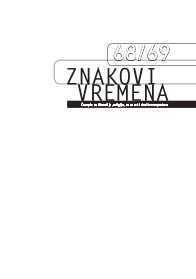Studije Balkana i poststrukturalizam
Balkan Studies and Post-structuralism
Author(s): Sanja Lazarević RadakSubject(s): Philosophy, Contemporary Philosophy, Structuralism and Post-Structuralism, Philosophy of Language
Published by: Naučnoistraživački institut »Ibn Sina«
Summary/Abstract: Poststructuralist “theories” which were criticized as a static and schematic tradition within the forms of theoretical dogmas, did not remain insensitive to intercultural heritage. Starting from Michel Foucault, who draws attention to the processes of control and marginalization of subjects, it is clear that the poststructuralist conception, although without explicit intention to question the political is still inseparable from the critique of power relations. Although Lacan deals with the way in which the body becomes subject and although his mirror-stage theory have nothing to do with political relations, understanding of the role of language as a second and its links with others, paves the way for the theory of self-understanding and self-definition through the pictures they sent us” other “subjects. These concepts are woven into imagological identifying constructs, the work of Julia Kristeva strangeness and Balkan otherness by Slavoj Zizek. Finally, Jacques Derrida, not only deconstruct the logic on which Western epistemology is built, but he allows the freedom of non-western ways of conceptualizing. On several occasions he was directly involved in the political debate by showing the implications of deconstruction on Eurocentrism. If the Balkans can be considered a postcolonial geography, a post-structuralist critics enabled the theoreticians of the contemporary social situation, to recognize the Balkans as peripheral space and highlight the actions of his discursive formation.
Journal: Znakovi vremena - Časopis za filozofiju, religiju, znanost i društvenu praksu
- Issue Year: XVIII/2015
- Issue No: 68-69
- Page Range: 141-154
- Page Count: 14
- Language: Bosnian

